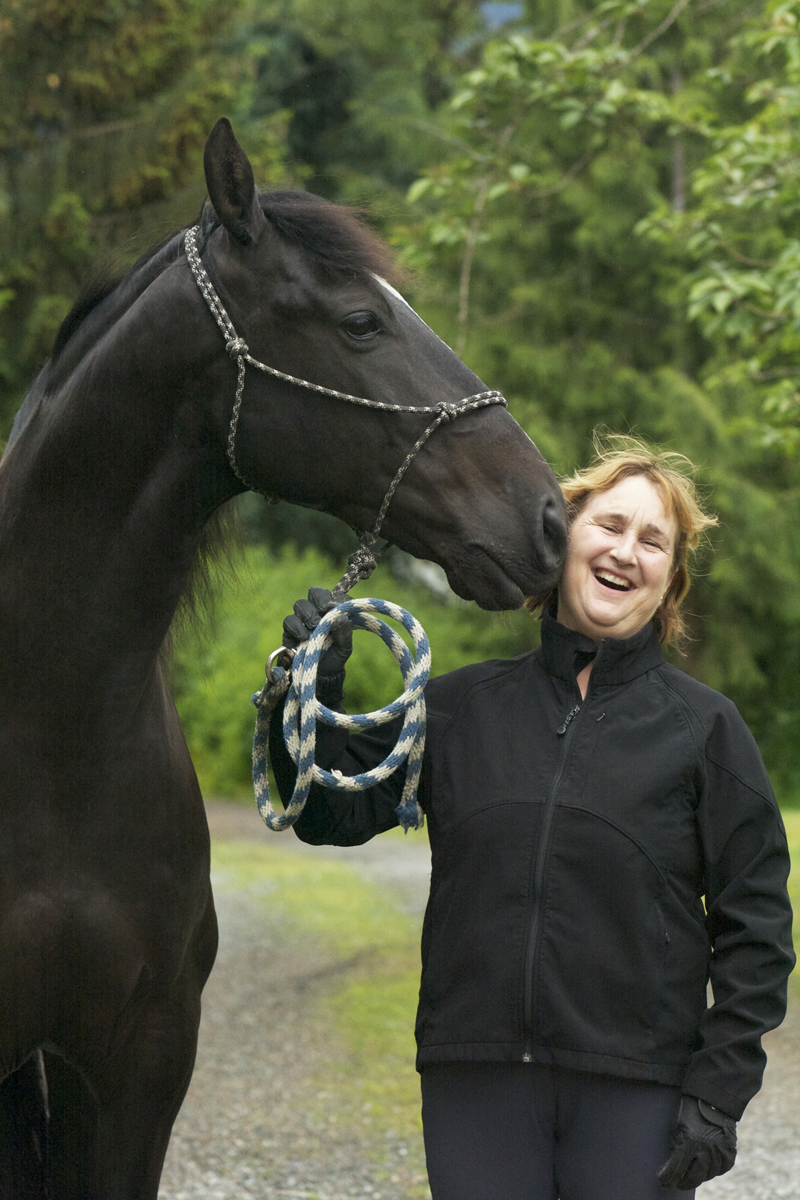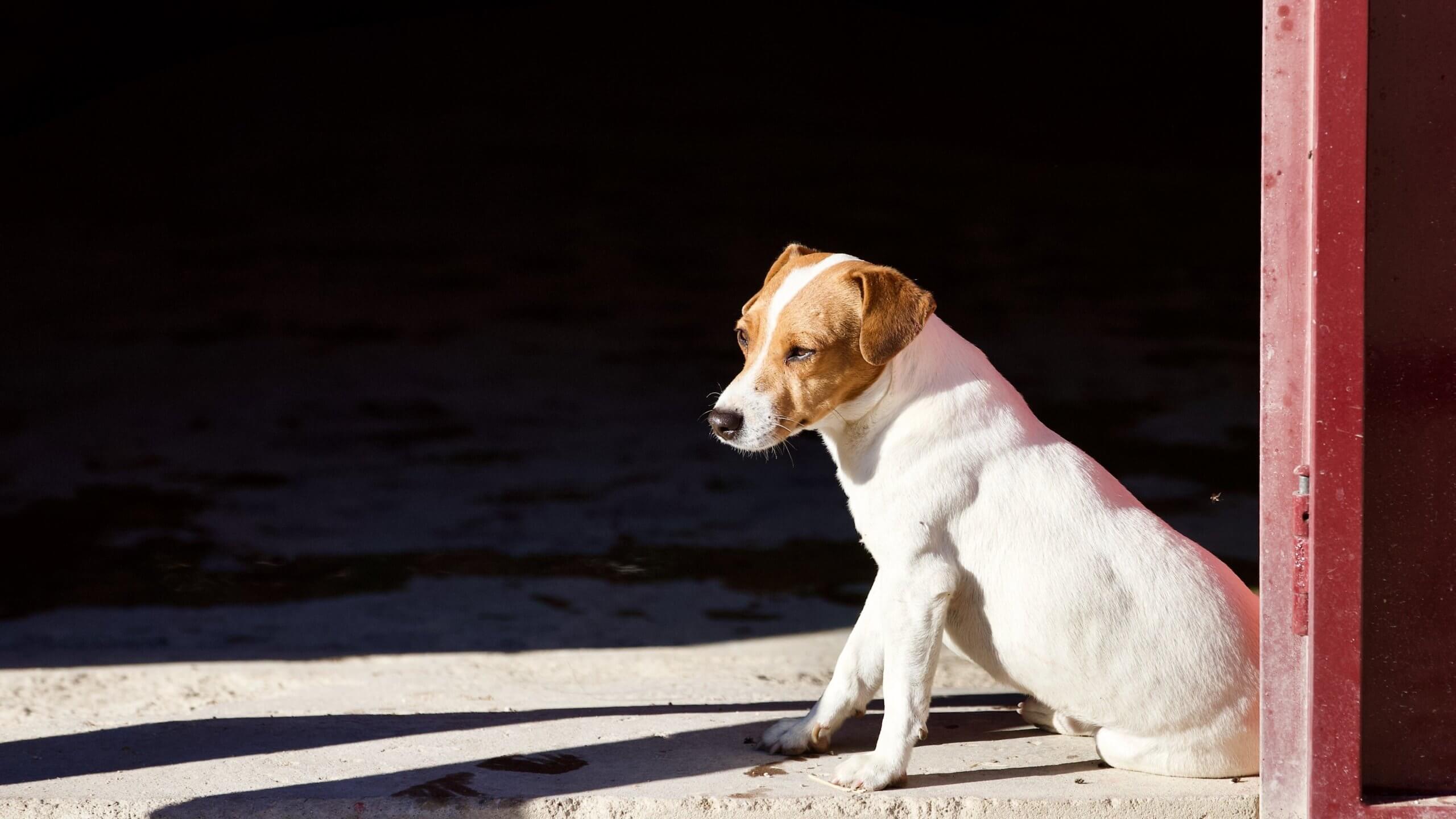Drive into any horse place and you’re bound to be met by a dog or two (or three). Horse people love animals of all kind, but dogs are right up at the top of horse people’s list of favorite companion animals along with horses and cats.
But what dog breeds are best to have on the ranch or farm? Which dogs are best suited for hanging out around equines? And should horse owners think about their horses when choosing a dog breed? Here are some important things to consider before bringing a dog home to your horses.
Good Around Horses

Traditionally, dogs bred to herd cattle and sheep like Australian Shepherds, Australian Cattle Dogs (also known as blue or red heelers), Welsh Corgis, Border Collies (collies of all kinds), McNabs, Shetland Sheep Dogs, Catahoula Leopard Dogs, Icelandic Sheepdogs and others in the herding group are popular on ranches and horse farms. Herding dogs are naturally aware of livestock and know instinctively how to avoid getting kicked and/or stepped on. They have an innate respect for horses and mind their owners with their desire to please and work.
Herders are renowned for being highly intelligent and quickly learn what the jobs are around a ranch. They’ll alert their owners to a horse in trouble and they’re energetic enough to help out when and where needed. They’re extremely loyal and territorial so they stay close to home and rarely wander. When riding out with you, they stay close to the horses and usually don’t run off after wildlife the way a hunting breed might do.
That being said, many of the herding group can be so loyal to their owners they become overly protective – not always good in a commercial stable setting or for horsemen who have children (and children’s friends) around.
Herders are such hard workers that they don’t always have an “off” button. Most Australian Cattle Dog owners wouldn’t own another kind of dog, but they’re the first to tell you this breed isn’t for everyone. Bred to “nip” the heels of cattle and endure a kick or two, they’re hard-headed and need diligent training to not “heel” horses (or people for that matter). Border Collies are also high-energy herders who need work and plenty of exercise or they’ll make a job for themselves that might not be appreciated by their owners or others.
Welsh Corgis – both Pembroke and Cardigan – are the sweethearts of the herding group, as they tend to be very good with children (and all people for that matter). Because of this they are very popular among horse people. Corgis are super around horses but are also known to nip heels now and then and have a strong urge to chase, both animals and running children.
Guard Dogs
 If you live in a remote rural area you may desire a dog who’s not just a pet but serves as a guard dog too. Naturally protective dogs will alert their owners to people, predators, and problems with the livestock. These dogs can be a valuable asset to a ranch. Protectiveness occurs in many breeds, but dogs like Doberman Pinschers, German Shepherds, Rottweilers, Mastiffs, Malinois, and Rhodesian Ridgebacks, are often chosen for this purpose. Large breeds will be less likely to be injured by predators such as coyotes. Needless to say, strong, protective dogs need owners who are consistent and capable at training them. Many of these dogs aren’t naturally “good” with horses or other livestock, though they can learn to stay out from underfoot and not bother the horses. Another downside of these large breeds is that they don’t travel well; being large makes it hard to fit them in a vehicle and their innate protectiveness makes the dogs uncomfortable (and often less welcome) in public situations.
If you live in a remote rural area you may desire a dog who’s not just a pet but serves as a guard dog too. Naturally protective dogs will alert their owners to people, predators, and problems with the livestock. These dogs can be a valuable asset to a ranch. Protectiveness occurs in many breeds, but dogs like Doberman Pinschers, German Shepherds, Rottweilers, Mastiffs, Malinois, and Rhodesian Ridgebacks, are often chosen for this purpose. Large breeds will be less likely to be injured by predators such as coyotes. Needless to say, strong, protective dogs need owners who are consistent and capable at training them. Many of these dogs aren’t naturally “good” with horses or other livestock, though they can learn to stay out from underfoot and not bother the horses. Another downside of these large breeds is that they don’t travel well; being large makes it hard to fit them in a vehicle and their innate protectiveness makes the dogs uncomfortable (and often less welcome) in public situations.

Livestock Protection
For horsemen and ranchers with properties that house sheep, goats, cow/calf operation, chickens, as well as horses, working dogs specifically bred to protect livestock such as Great Pyrenees, Catahoula Leopard Dogs, Anatolian shepherds, and Bernese Mountain Dogs can be valuable on the farm or ranch. These dogs are bred to protect livestock from predators such as coyotes, cougars, bears, eagles, and other predators. It’s common to find these dogs mixed with each other or with herders like border collies to create a multi-purpose dog for herding and protection. Downsides is that their large size makes them difficult to travel with and grooming can also be a challenge.
Good Travelers
Horse owners who are on the road a lot attending horse shows, expos, or clinics often prefer smaller breeds that easily fit in the truck, clean up well, and are laid back enough to be welcome by others in more public settings. Corgis, Jack Russel Terriers, Fox Terriers, Whippets, Australian Cattle Dogs, smaller Border Collies, and Miniature Australian Shepherds are all very popular among the horse-showing set.
Friendly and Welcoming
For people with children or those who own an equine facility owning a friendly, non-aggressive dog might top their choice list. Standard Poodles, Labrador and Golden Retrievers, Greyhounds, Corgis, Icelandic Sheepdogs and of course many mixed-breed dogs fit the bill nicely.
Additional Considerations
- Fragility – It’s important to consider how delicate the dog is if it’s going to be hanging around horses. The toy breeds are really not suitable as being stepped-on or kicked can spell disaster. They’re also easily picked off by predators that live on ranches such as eagles, coyotes, and bob cats.
- Easy Grooming – If your dogs are part of the family and sleep in the house at night, it’s worth thinking about how much dirt and debris their coats naturally pick-up and hold. This is where the short-haired breeds like Whippets and Jack Russel Terriers can be really nice on the farm. Some of the collie breeds, like Border Collies, also have slick hair that is easy to clean mud and dirt from. Any dog with a thick under coat, like an Australian Cattle Dog, Australian Shepherd, or a Corgi will pack a lot of hair and dirt into the house.
- Liability Insurance – Many insurers charge extra for breeds with a reputation to be aggressive – Pit Bulls, German Shepherds, and Rottweilers among others might cause your homeowners or commercial liability insurance companies to raise rates.
- Rodent Control – Some breeds are known for their ability to find and kill rodents. Jack Russel Terriers, Whippets, Rat Terriers, Schipperkes and many other breeds can be helpful in this way.
- Barking – This is often a training problem, but loud dogs can drive horses crazy (and their owners). Quieter breeds will be better for both the equines and people on a horse farm.
 The equestrian lifestyle, especially on a ranch or farm, makes us lean in the direction of certain suitable types of dogs. But let’s face it, horse people have as many opinions about the “best” dogs as we have about the “best” breed of horses, and we’re an opinionated bunch! What’s most important is that when you bring a dog onto a horse farm you take into consideration how horses and other horse owners are going to react to that dog.
The equestrian lifestyle, especially on a ranch or farm, makes us lean in the direction of certain suitable types of dogs. But let’s face it, horse people have as many opinions about the “best” dogs as we have about the “best” breed of horses, and we’re an opinionated bunch! What’s most important is that when you bring a dog onto a horse farm you take into consideration how horses and other horse owners are going to react to that dog.
All dogs need training and socializing to be good dogs, but some will be more challenging than others. Dogs who live on (or visit) horse farms need owners who are diligent and thoughtful about the impact their pets have on other people and animals. Regardless of the kind of dog you choose, be sure you’re up for the challenge involved in training them to be good “horse” dogs and be prepared to keep your dog, horses, and other people safe.
Published in the September 2020 Issue:

Kim Roe grew up riding on the family ranch and competed in Western rail classes, trail horse, reining, working cow, and hunter/jumper. She trained her first horse for money at 12 years old, starting a pony for a neighbor.
Kim has been a professional dressage instructor in Washington state for over 30 years, training hundreds of horses and students through the levels. In recent years Kim has become involved in Working Equitation and is a small ‘r’ Working Equitation judge with WE United.
Kim is the editor of the Northwest Horse Source Magazine, and also a writer, photographer, and poet. She owns and manages Blue Gate Farm in Deming, Washington where she continues to be passionate about helping horses and riders in many disciplines.

